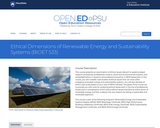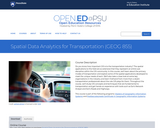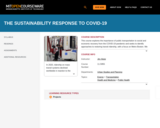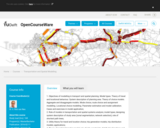
A progressive blog addressing topics such as affordable housing, urban planning, zoning, and public transportation.
- Subject:
- Economics
- Social Science
- Material Type:
- Reading
- Author:
- Chris Harris
- View My Complete Profile
- Date Added:
- 06/25/2023

A progressive blog addressing topics such as affordable housing, urban planning, zoning, and public transportation.

This course presents an examination of ethical issues relevant to systems-based research procedures, professional conduct, social and environmental impacts, and embedded ethics in research and professional practice in RESS based jobs. In this course, you will consider case studies of ethical issues that can arise when engaging renewable energy and sustainability systems. You will also develop an ethics case study based on your area of RESS interests. The goals of the course are to provide you with tools for analyzing ethical issues both in the line of professional duties and in consideration of the various ethical issues that face an entire sector of renewable energy and that underpin the very reasons for taking a sustainable and renewable approach.

Students will be randomly assigned groups with the following cities: Berlin, Wien, und Zurich. They will be given a budget and need to create an itinerary for a week-long stay.

Students will practice planning a trip to a German city. They will need to follow a budget when planning their activities.

Do you know how important GIS is to the transportation industry? The spatial applications to this field are so extensive that they represent an entire sub-discipline within the GIS community. In this course, we'll learn about the primary modes of transportation and explore some of the spatial applications developed to meet the unique needs of each. We'll also take a close look at some key organizations in the industry and learn firsthand from more than a dozen transportation professionals about the role GIS plays for them. Throughout the course, we'll study GIS concepts and techniques that are fundamental to transportation and get hands-on experience with tools such as Esri's Network Analyst and Esri's Roads and Highways.

This course explores the importance of public transportation to social and economic recovery from the COVID-19 pandemic and seeks to identify approaches to restoring transit ridership, with a focus on Metro Boston. We will attempt to (1) understand whether and how the COVID-19 pandemic can advance sustainable mobility, and specifically the role(s) of public transportation in the COVID-19 recovery process, and (2) identify policies and/or interventions that may encourage pre-COVID transit riders to return to transit and attract net new transit ridership.

This course explores the importance of public transportation to social and economic recovery from the COVID-19 pandemic and seeks to identify approaches to restoring transit ridership, with a focus on Metro Boston. We will attempt to (1) understand whether and how the COVID-19 pandemic can advance sustainable mobility, and specifically the role(s) of public transportation in the COVID-19 recovery process, and (2) identify policies and/or interventions that may encourage pre-COVID transit riders to return to transit and attract net new transit ridership.

1. Objectives of modelling in transport and spatial planning. Model types. Theory of travel and locational behaviour. System description of planning area. Theory of choice models. Aggregate and disaggregate models. Mode choice, route choice and assignment modelling. Locational choice modelling. Parameter estimation and model calibration. Cases and exercises in model application; 2. Role of models in transportation and spatial systems analysis; model types; designing system description of study area (zonal segmentation, network selection); role of shortest path trees; 3. Utility theory for travel and location choice; trip generation models, trip distribution models; applications; 4. Theory of spatial interaction model; role of side constraints; distribution functions and their estimations; constructing base matrices and estimating OD-tables; 5. Theory of individual choice models; 6. Disaggregated choice models of the logit and probit type for time choice, mode choice, route choice and location choice; 7. Integrated models (sequential and simultaneous) for constructing OD-tables; 8. Equilibrium theory in networks and spatial systems; 9. Route choice and assignment; derivation of different model types (all-or-nothing model, multiple route model, (stochastic) equilibrium model); assignment in public transportation networks; analyses of effects; 10. Calibration of parameters and model validation; observation, estimation, validation; estimation methods; 11. Individual exercise computing travel demand in networks; getting familiar with software; computing all transportation modelling steps; analyse own planning scenarios; writing a report.Study Goals: 1. Insight in the function of mathematical models in transportation and spatial planning; 2. Knowledge of theoretical backgrounds of models; 3. Knowledge of application areas of models; 4. Ability to develop one's own plan of analysis for model computations; 5. Ability to apply models on planning problems; 6. Ability to present outcomes of model computations.